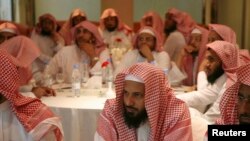Human Rights Watch commended Saudi Arabia on its new regulation that strips power from the often criticized religious police force.
The Saudi cabinet passed the measure last week which prevents religious police from stopping, arresting, chasing or detaining people.
The Council of Ministers also requested the religious police, formally known as the Commission for the Promotion of Virtue and Prevention of Vice or Mutawaa, to carry official identification showing name, position, work hours, and branch.
“This is a positive move for Saudi citizens and residents who have suffered years of harassment and abuse by the religious police,” Human Rights Watch Middle East Director Sarah Leah Whitson said.
The new guidelines say that only police and drug squad officers have the jurisdiction to make arrests.
“Saudi Arabia has taken a step that could rein in longstanding religious police abuses, but authorities must enforce the new regulations for them to have any meaning,” Whitson said.
The Mutawaa is responsible for enforcing the country’s strict interpretation of Islam, by, for example, ensuring that women are covered from head to toe in public, that they are not mingling with unrelated men, and that all shops are closed during the five daily prayers.
Whitson said the “authorities should go even further and strip the religious police of the power to enforce sex segregation rules.”
The controversial Mutawaas were barred from interrogating and pressing charges back in 2013; such actions could only be validated with the support of accompanying policemen. But abuses were said to have continued.
In February, the controversial law enforcement group apprehended two women in Riyadh, capital city of Saudi Arabia, and told them to cover their faces. According to the Arab News, the religious police ordered them to get into their car, but they refused. While one of the women escaped to a nearby mall, the other was shoved and dragged on the ground as videos posted on social media networking sites showed.
A five-member advisory committee is set to make suggestions to the Mutawaa president on holding officers accountable for any violence or abuse.
"It's a very, very controversial issue inside Saudi Arabia,” Fawaz Gerges, professor of Middle Eastern studies at the London School of Economics, told CNN, adding, “Obviously the leaders of Saudi Arabia, the political leaders, have decided that the religious police is doing more damage than good and they are very much concerned with the popular misgivings about recent incidents in the kingdom."




